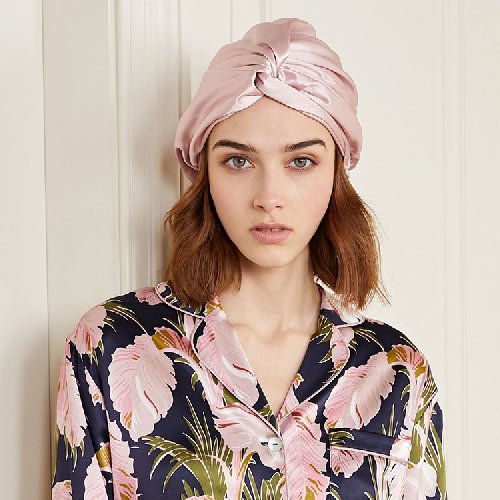Silk brings so many benefits to our lives. It can significantly improve our health, improves our relaxation, enhances our sleep, with both short-term & long-term benefits reaped by those who know what Silk brings to the table. Not only the silk fabric is made up of natural materials, but it is also highly durable and resistant – which means that an average piece of silk fabric will last for quite a while, years, or even decades.
While silk fabric may not be one of the most affordable choices, Silk provides the most value. And besides that, why shouldn’t you invest in your sleeping wear and other items? You don’t have to book a restaurant or hotel to experience the tremendous luxurious lifestyle; choose Silk and experience.
Surprising Benefits of Silk
Here are some of the must-know benefits of soft Silk that you need to know.
Anti-aging
Studies have revealed many times that the composition of soft Silk fabric can counter any harmful severe effects of aging, especially on your face skin, & can also help calm your body’s nervous system. Thus, it speeds up the human metabolism of skin cells.
Silk feels much smoother and softer than any other fabric on the skin. It will not absorb your natural moisture, consequently allowing for more appropriate and efficient use of night creams. This results in more precise, luminous human skin – and we all know that hydrated skin cells show fewer lines & wrinkles than dry skin.
Temperature Regulator
Soft Silk naturally regulates your body temperature throughout the night. Sheets or Silk clothes keep you comfortably cool and dry in the summer season and keep you cozy in the winter. Because the Silk is very breathable, women’s health medical experts also recommend this soft fabric to alleviate menopause symptoms, like hot flashes & night sweats.
Durability and Hygiene
Top-quality Mulberry silk bedding ware can last upwards of 15 to 20 years if taken care of properly. Silk clothes are one of the most robust natural textile fabrics in the world. The soft Silk is made from top-quality silk fibers with a denser weave of about 750 TCI (per inch). The resulting silk fabric can be mighty, withstand most of the accidental damage with really ease.
Silk is the most hygienic & soft cloth material to be used as room bedding since this material is resistant to dust & some other common or natural causes of household bedding stains. So if you are a person who is looking to get rid of a down comforter because of dust, mites, or some allergies, getting a silk-filled comforter will surely solve all your problems instantly.
Helps Prevent Overheating
This is one of the essential advantages of using soft silk bedding. When sleeping under customary or traditional bedding, your body heat & sweat get trapped under the fabric covers. With soft silk bedding, it’s efficiently and quickly vented away due to its breathability.
A soft silk duvet cover also ensures that there’ll be absolutely no static electricity or any heat conductivity, making it one of the perfect choices for solo sleepers and partnered ones. This means silk fabric can keep your human body at the ideal temperature even on the hottest of days or coldest nights or retain heat if it gets too hard. The result is highly a good night’s sleep & waking up feeling fresh.
Silk Is a Natural Product
Being a natural soft fiber, Silk is far more breathable than any other synthetic fiber. Most of the advantages we will be discussing beyond this point are related to this property. Natural silk fibers tend to have a much more luxurious feel & bounce.
This bouncing property is present in all-natural and soft fibers like Silk & wool. The material’s unique crimp makes it more resilient, which helps the soft fibers behave pretty similar to tiny springs, allowing you to enjoy sleep peacefully at night. This is why natural fibers such as Silk are an excellent option for a more organic lifestyle.
Helps in Joint Disorders
Traditional or you can say old bedding material doesn’t; instead, it forms a much more heavy barrier that can cause you extreme pain & even irritation. Removing single issues of pressure is the quickest and easiest way to increase your comfort level and sleep quality.
As mentioned before – silk-made bedding & duvets tend to easily wrap around the human body, molding around it & eliminating the chance of single push or pressure points.
Decreases Chemical Exposure
The human body is exposed to various chemicals each day. Cotton material is usually treated with multiple harsh and harmful chemicals to make it more resistant to wrinkles & fire. Hence, when sleeping under cotton-made bedding – these tend to rub against the human skin.
Pure soft silk bedding reduces the risk of exposure to dangerous chemicals used in other types of bedding. It isn’t treated with harmful chemicals to ruin the silk fabric’s soft, smooth texture. Soft Silk is naturally wrinkle-free & fire-resistant, so you are protected against exposure to many different substances.
No Sweat
As we all know, silk fabric is not a highly absorbent cloth material. It does have some natural moisture-wicking cloth properties, as silk fibers evaporate moisture at an extremely rapid rate. With the structure of soft Silk being made from thin & tightly intertwined fibers, this makes millions of air pockets, allowing the human sweat to move through the Silk & evaporate into the air to keep the body dry and comfortable all day and night.
Final Thoughts
The technology of making the soft silk fabric thread is unique – it is obtained by unwinding the small cocoons of the soft silkworms. The secret to the creation of silk fabric for a long time was known only in the country of China. Even though now soft silk fabric is made in India, Brazil, Pakistan & other such countries, China remains one of the biggest producers of Silk.
From soft silk fabric, we can sew practically everything: underwear (corsets, panties); accessories (such as hair clips, neck scarves); women’s clothing (such as blouses, skirts, jackets, dresses); men’s clothing (like shirts, ties) bed linen (like pillowcases, duvet covers); home décor materials (such as napkins, tablecloths,), etc.

